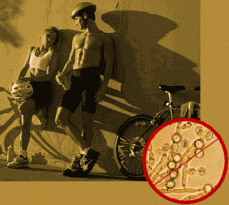Candida is caused by the yeast-like fungus or yeast infection, Candida albicans which normally lives in healthy balance with other (benign) bacteria and yeasts that inhabit our mouths, bowels, skin and other mucous membranes.
When this natural balance is upset, Candida multiplies dramatically and lodges deep into the tissues. Candida imbalance may be present for long periods without causing symptoms, especially in men, but may become troublesome due to hormonal changes, stress, emotional factors, or an unbalanced diet.
Symptoms
 Many people suffer from an overgrowth of candida and this condition (called Candidiasis) presents with a wide variety of symptoms which may vary greatly in each individual such as:
Many people suffer from an overgrowth of candida and this condition (called Candidiasis) presents with a wide variety of symptoms which may vary greatly in each individual such as:
Allergies to foods and/or airborne chemicals: The number of offending substances keeps increasing until many people become ‘universal reactors’.
Fatigue: Continual, often more noticeable after eating. Candida can cause this.
Gastrointestinal: Poor digestion, constipation, diarrhoea, gas, bloating, cramps, heartburn. Think Candida.
Neurological: Sugar craving, irritability, mood swings, headaches, migraine, ‘fogged in’ feeling, poor concentration, dizziness, depression, anxiety. Look for Candida or yeast infection.
Genito-urinary: Vaginal infections, menstrual problems, impotence, infertility, prostatitis, rectal itch, urinary infections.
Respiratory: Catches colds and flu easily, congestion, post nasal drip, asthma, bronchitis, earaches, sore throats.
Skin: Athlete’s foot, jock itch, hives, psoriasis, skin rashes.
Clinical history (early childhood): Hyperactivity, cradle cap, nappy rash, thrush, chronic ear infections, tonsillitis, colic.
Miscellaneous: Feel bad all over, cold extremities, aches, white coated tongue upon rising.
All of the above can have their origins in an overgrowth of the fungus candida albicans. It is important however to note that not all individuals presenting some combination of the above symptoms will have a Candida problem, but the likelihood is great.
Causes
There are the many factors that can cause candidiasis. Here are a few of the main ones:
- Antibiotic use
- The oral contraceptive pill
- The use of cortisone and other steroids
- Poor dietary habits
- Stress
Antibiotics destroy the healthful bacteria which control the Candida population. Antibiotics simply help the spread of candida yeast. They should be strictly avoided unless it is absolutely necessary. Candidiasis may result from exposure to steroid or chemo-therapeutic drugs, prolonged illness, stress, alcohol abuse, smoking, lack of rest, poor nutrition and chemical preservatives in food. The leakage of mercury from so-called “silver” amalgam fillings appears to be a factor as well. The female hormone progesterone found synthetically in birth control pills, stimulates Candida growth. Today’s low nutrient, low bulk, high refined carbohydrate diet of most people will, over a period of years, transform a healthy large intestine into a lifeless pipe caked with layers upon layers of encrusted faecal matter – the site of constant putrefaction, fermentation, and poor nutrient absorption.
What To Do About Candida
With proper treatment, symptoms can improve or disappear altogether. A successful treatment protocol commonly referred to as the weed- seed- feed approach involves a combination of diet, supplementation and homeopathics. In most cases the extreme symptoms will abate within one week and the problem can be cleared up very rapidly.
 Firstly, boosting your immune function is important as this will help your body to fight the infection more effectively. Then, weed; starve the Candida with a special diet, giving no carbohydrates for a specific time (usually five days). Using natural antifungal agents to directly kill or hamper the growth of Candida can provide even quicker results. Secondly, seed; bombard your system with friendly bacteria. Thirdly, feed; bolster the immune system, enhancing the healing response and finally altering the environment where Candida grows to reduce the risk of future infection.
Firstly, boosting your immune function is important as this will help your body to fight the infection more effectively. Then, weed; starve the Candida with a special diet, giving no carbohydrates for a specific time (usually five days). Using natural antifungal agents to directly kill or hamper the growth of Candida can provide even quicker results. Secondly, seed; bombard your system with friendly bacteria. Thirdly, feed; bolster the immune system, enhancing the healing response and finally altering the environment where Candida grows to reduce the risk of future infection.
A Candida cleanse has as it’s goal, not to eliminate Candida or yeast but to bring it back down to a normal manageable level. Remember, Candida and yeast naturally exists in our body. It is when it has spread and becomes overgrown that problems arise.
A diet free of yeast and sugar will help your body to fight Candida infection. Avoid bread, alcohol, mushrooms and yeast spreads, as well as sugar in any form. (Hint – when checking ingredient lists, words ending in -ose, such as maltose, lactose and glucose, generally refer to forms of sugar).
Garlic and onions display antimicrobial actions and should be eaten liberally to assist the body to fight the infection. Yoghurt containing live probiotics such as acidophilus and bifidus is also a valuable addition to the diet. As you kill off the harmful bacteria, it is helpful to use a probiotic to assist your body with the making of good bacteria. It is also important to boost your immune system by eating plenty of fresh fruit and vegetables.
Your liver is a major organ involved in the detoxification process. So, your liver needs to be running smoothly and efficiently in order for your system to be running normally. Your liver can become overwhelmed with toxins, which means they will just continue to be reabsorbed into your system. You can support your liver with supplements such as: dandelion root, milk thistle, burdock root, vitamin c and exercise.
Remember, to try and alleviate stress as much as possible. When you become stressed, your body releases sugars into your blood. This feeds the overgrowth of Candida yeast. So, minimising your daily stress can help in controlling Candida and yeast in your body.
Exercise is just as important in your efforts to cleanse your body. Exercise helps your body work more efficiently and acts to release your stress levels, as well as assisting in the detoxification process. Taking a
nice walk, jog, or even riding a bicycle can work wonders for your body.
The success of a Candida program is ensured by education about dietary requirements for a healthy body as changes in lifestyle are often needed to maintain the new level of health and well being. If all this sounds too difficult take heart: once you start feeling better than you have for years, you will really want to maintain this renewed vitality. Altering the habits which got you into the previous imbalance will become easy as the rewards will be far greater than the instant gratification of a junk food diet. Spring in your step, a clear head, sparkling healthy skin, and a well functioning digestive system are just a few of the gifts you can give to yourself.
